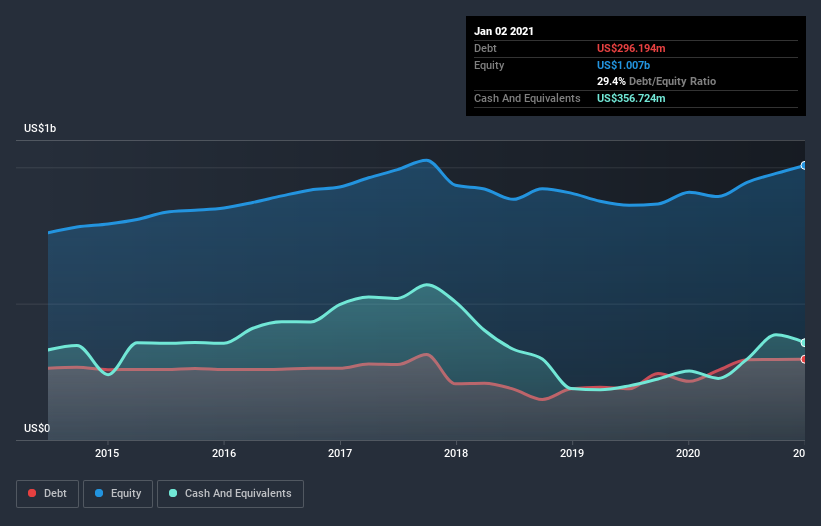Does Plexus (NASDAQ:PLXS) Have A Healthy Balance Sheet?
Some say volatility, rather than debt, is the best way to think about risk as an investor, but Warren Buffett famously said that 'Volatility is far from synonymous with risk.' So it seems the smart money knows that debt - which is usually involved in bankruptcies - is a very important factor, when you assess how risky a company is. As with many other companies Plexus Corp. (NASDAQ:PLXS) makes use of debt. But the real question is whether this debt is making the company risky.
When Is Debt A Problem?
Debt assists a business until the business has trouble paying it off, either with new capital or with free cash flow. In the worst case scenario, a company can go bankrupt if it cannot pay its creditors. However, a more usual (but still expensive) situation is where a company must dilute shareholders at a cheap share price simply to get debt under control. Of course, plenty of companies use debt to fund growth, without any negative consequences. The first thing to do when considering how much debt a business uses is to look at its cash and debt together.
View our latest analysis for Plexus
What Is Plexus's Debt?
You can click the graphic below for the historical numbers, but it shows that as of January 2021 Plexus had US$296.2m of debt, an increase on US$215.0m, over one year. However, its balance sheet shows it holds US$356.7m in cash, so it actually has US$60.5m net cash.
How Strong Is Plexus' Balance Sheet?
The latest balance sheet data shows that Plexus had liabilities of US$955.5m due within a year, and liabilities of US$309.6m falling due after that. On the other hand, it had cash of US$356.7m and US$597.9m worth of receivables due within a year. So its liabilities total US$310.5m more than the combination of its cash and short-term receivables.
Since publicly traded Plexus shares are worth a total of US$2.60b, it seems unlikely that this level of liabilities would be a major threat. However, we do think it is worth keeping an eye on its balance sheet strength, as it may change over time. Despite its noteworthy liabilities, Plexus boasts net cash, so it's fair to say it does not have a heavy debt load!
Also good is that Plexus grew its EBIT at 13% over the last year, further increasing its ability to manage debt. The balance sheet is clearly the area to focus on when you are analysing debt. But it is future earnings, more than anything, that will determine Plexus's ability to maintain a healthy balance sheet going forward. So if you're focused on the future you can check out this free report showing analyst profit forecasts.
Finally, while the tax-man may adore accounting profits, lenders only accept cold hard cash. Plexus may have net cash on the balance sheet, but it is still interesting to look at how well the business converts its earnings before interest and tax (EBIT) to free cash flow, because that will influence both its need for, and its capacity to manage debt. In the last three years, Plexus's free cash flow amounted to 29% of its EBIT, less than we'd expect. That weak cash conversion makes it more difficult to handle indebtedness.
Summing up
Although Plexus's balance sheet isn't particularly strong, due to the total liabilities, it is clearly positive to see that it has net cash of US$60.5m. On top of that, it increased its EBIT by 13% in the last twelve months. So we don't have any problem with Plexus's use of debt. The balance sheet is clearly the area to focus on when you are analysing debt. But ultimately, every company can contain risks that exist outside of the balance sheet. For example, we've discovered 1 warning sign for Plexus that you should be aware of before investing here.
Of course, if you're the type of investor who prefers buying stocks without the burden of debt, then don't hesitate to discover our exclusive list of net cash growth stocks, today.
This article by Simply Wall St is general in nature. It does not constitute a recommendation to buy or sell any stock, and does not take account of your objectives, or your financial situation. We aim to bring you long-term focused analysis driven by fundamental data. Note that our analysis may not factor in the latest price-sensitive company announcements or qualitative material. Simply Wall St has no position in any stocks mentioned.
Have feedback on this article? Concerned about the content? Get in touch with us directly. Alternatively, email editorial-team (at) simplywallst.com.

 generic
generic 
